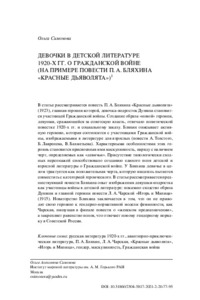A CIVIL WAR HEROINE LIUDMILA MOKIEVSKAYA-ZUBOK: HISTORICAL DOCUMENTS AND FICTIONAL CHARACTER
Simonova Olga
A CIVIL WAR HEROINE LIUDMILA MOKIEVSKAYA-ZUBOK: HISTORICAL DOCUMENTS AND FICTIONAL CHARACTER
Simonova Olga
RUSSIAN ACAD SCIENCES, GORKY INST WORLD LITERATURE
Julkaisun pysyvä osoite on:
https://urn.fi/URN:NBN:fi-fe2023020826263
https://urn.fi/URN:NBN:fi-fe2023020826263
Tiivistelmä
The article discusses the influence of historical evidence about Liudmila Mokievskaya-Zubok on her fictional character. Mokievskaya-Zubok was a heroine of the Russian Civil War, the only famous female commander of the armored train. Obituaries honor Mokievskaya as both a comrade and a commander but also emphasize her femininity, which does not seem to contradict her performing of combat tasks. Mokievskaya became a fictional character due to the efforts of her friend, a writer Zinaida Chalaya. In her essay "Commander of an Armored Train," Chalaya described Mokievskaya according to the template: girl - commander - hero. This sequence forms the matrix of the heroine's canonization. In 1923, Chalaya's story "At Dawn" was published. The main character was inspired by Liudmila Mokievskaya while the author herself seems to have served a prototype for this character's rival. The plot of it is based on the love story which was not mentioned in Mokievskaya's biography. In both the obituaries and Chalaya's story, a new femininity is constructed: the female character is an active agent who plays a part not usually attributed to a woman but that is, however, asserted as normative. Mokievskaya's life story had a narrative potential that manifested itself in oral legends as well as her subsequent memorialization.
Kokoelmat
- Rinnakkaistallenteet [27094]
